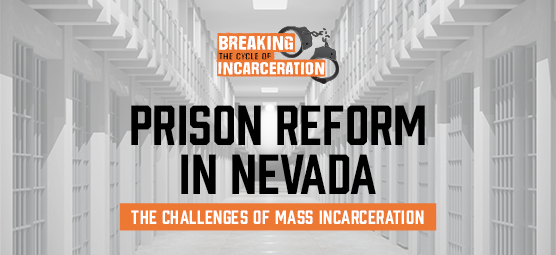Prison Reform in Nevada: The Challenges of Mass Incarceration

Nevada’s prison population has skyrocketed over the past decade, reflecting a similar trend across the nation. The United States has the world’s highest incarceration rate. In this first in a series of three public forums titled Breaking the Cycle of Incarceration, state officials and community leaders provide a high-level overview of the biggest challenges facing Nevada’s correctional institutions.
Featured Speakers
Charles Daniels
The Nevada Department of Corrections (NDOC) welcomes Charles Daniels who began as our new Director on December 10, 2019. Daniels has been in corrections over 30 years working in various leadership roles. After leaving the Air Force in 1988, Daniels joined the Federal Bureau of Prisons as a correctional officer in California and spent the next 28 years working his way up to complex warden at institutions in Beaumont, Texas (2013-2015) and Terre Haute, Indiana (2015-2016). In between, he served as associate warden and warden at facilities in California, Illinois, and Oregon before moving to Washington, D.C. in 2008 to become the Senior Deputy Assistant to the Director for the Federal Bureau of Prison's Industries, Education, and Vocational Training Division. He also served as warden for a facility in Colorado. During this time, Daniels led a regional hostage negotiation team and developed an emergency response plan for correctional facilities. Daniels retired from federal service in 2016.
Daniels followed up his long career in federal service with a senior role in the New York City Department of Corrections where he helped manage a $1.8 billion operating budget. Daniels most recently served as Deputy Commissioner of Operations for the Alabama Department of Corrections.
Daniels is a graduate of the Aspen Institute Justice and Society Program, Center for Creative Leadership, and he holds a degree in Criminal Justice.
"Charles has had a long and respected career as a corrections professional in the state and federal systems," Governor Sisolak said. "Charles brings more than three decades of knowledge, management experience, and perspective that will bring needed structure, accountability, and reform to the Nevada Department of Corrections. I have full confidence in Charles' abilities, and I look forward to working with him to improve our state prison system."
Frank Rudy Cooper
Frank Rudy Cooper is William S. Boyd Professor of Law and Director of the Program on Race, Gender, and Policing. He graduated from Amherst College and Duke University Law School, where he was on the Duke Journal of Gender, Law & Policy and the Moot Court Board and served as a Research Assistant to Professor Jerome McCristal Culp. He clerked for the Honorable Solomon Oliver, Jr. (N.D. Ohio) and practiced in Boston.
Professor Cooper is a highly rated teacher of Criminal Procedure: Investigation, Criminal Procedure Theories, Civil Rights, Criminal Law, and Identities, Culture & Law. He was awarded three Derek Bok Center teaching awards while a teaching assistant to Professors Cornel West, Juliet Schor, and Laurel Thatcher Ulrich at Harvard University. He has also taught at Villanova University School of Law, Boston College Law School, and Suffolk University Law School. He has studied pedagogy extensively through Course Design Institutes.
Professor Cooper is also a productive scholar known for work in Criminal Procedure, Masculinities Studies, and Critical Race Theory, including co-editing the book, MASCULINITIES AND THE LAW: A MULTIDIMENSIONAL APPROACH (NYU Press 2012) (with Ann C. McGinley). His dozens of other publications have appeared in, inter alia, the Boston University Law Review, the University of California, Davis Law Review, the University of Illinois Law Review, and the Arizona State Law Journal.
Professor Cooper's service to his law schools has included chairing Teaching, Tenure, and Scholarship committees. He has been a leader nationally as well, having co-founded the SALT-LatCrit Junior Faculty Development Workshop and the John Mercer Langston Writing Workshop.
Athar Haseebullah
Local attorney and community organizer Athar Haseebullah, Esq., is the first person of color to lead the ACLUNV since its founding in 1966. He most recently served as general counsel and director of strategic initiatives for Opportunity 180, a Nevada non-profit focused on improving education quality in Nevada. Prior to his tenure with Opportunity 180, Haseebullah served as the Regional Transportation Commission of Southern Nevada’s senior government affairs and legal administrator. Haseebullah also spent several years as a litigator for both Legal Aid Center of Southern Nevada and the City of New York.
Haseebullah is a graduate of Howard University and Howard University School of Law. His organizational affiliations include his service as secretary for the Urban Chamber of Commerce, president of the local alumni chapter of Alpha Phi Alpha Fraternity, Inc., a member of the board of directors for the Interfaith Council of Southern Nevada, chairperson for the Masjid Ibrahim, and service with various other organizations. Haseebullah is a practicing Muslim whose parents immigrated to the United States from Pakistan.
Victoria Gonzalez
Victoria Gonzalez is the first executive director of the Nevada Department of Sentencing Policy. The Department was established in 2019 and houses the Nevada Sentencing Commission which is tasked with developing data-driven recommendations for sentencing and corrections policies in Nevada. Prior to being appointed the director, she served as deputy legislative counsel at the Legislative Counsel Bureau during the 2017 and 2019 Legislative Sessions where she assisted in drafting criminal law legislation and aided other LCB staff in supporting the Nevada Sentencing Commission when it was housed in the legislative branch as an interim committee. She also taught for three years in the Clark County School District.
Gonzalez is a graduate of the Law School at the University of Wisconsin-Madison where she earned a certificate in criminal law for her work on the Criminal Appeals Project, an internship with a local district attorney, and participation in a sentencing seminar. She also has master’s degree in Education from National University and a bachelor’s degree in English from the University of Utah.





